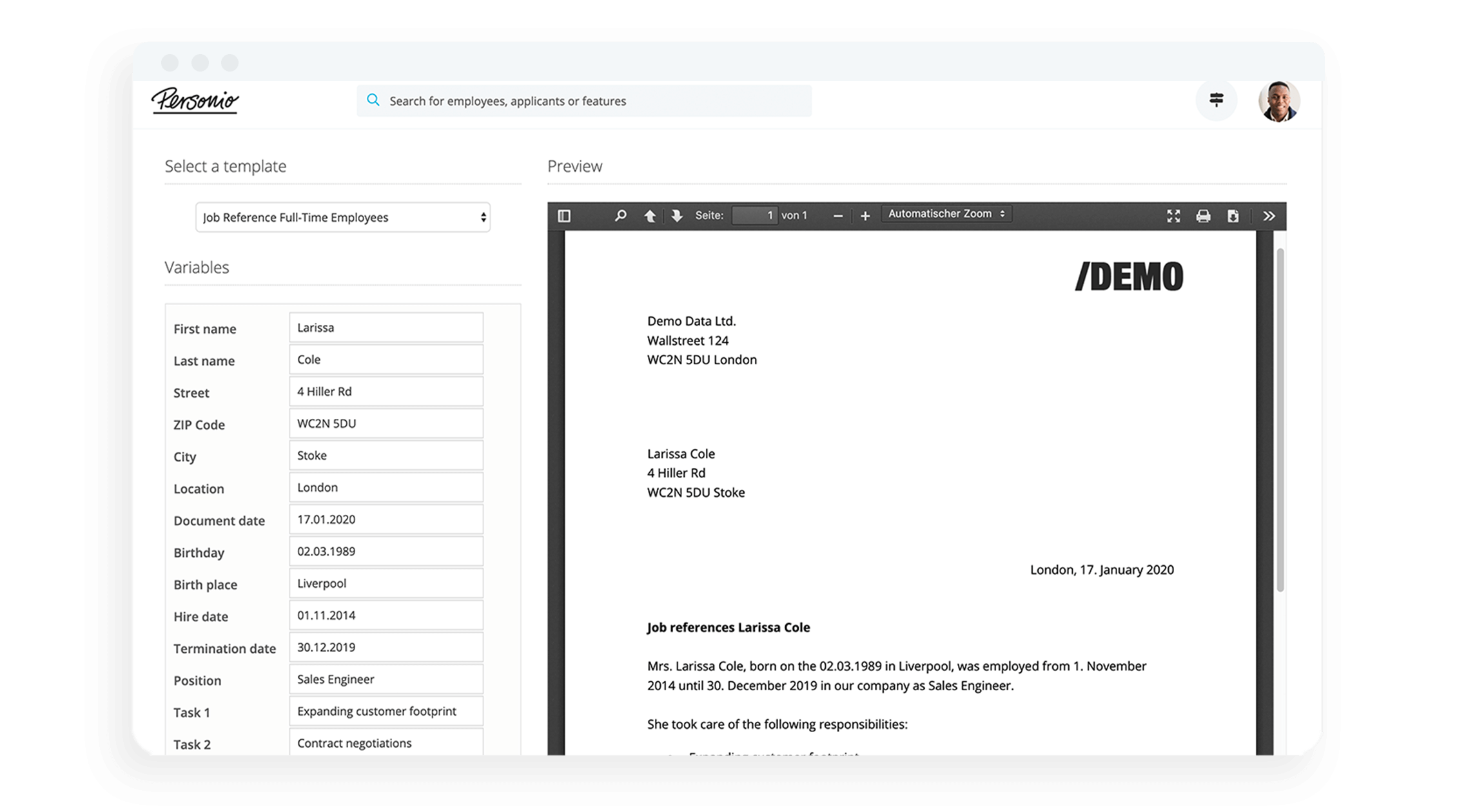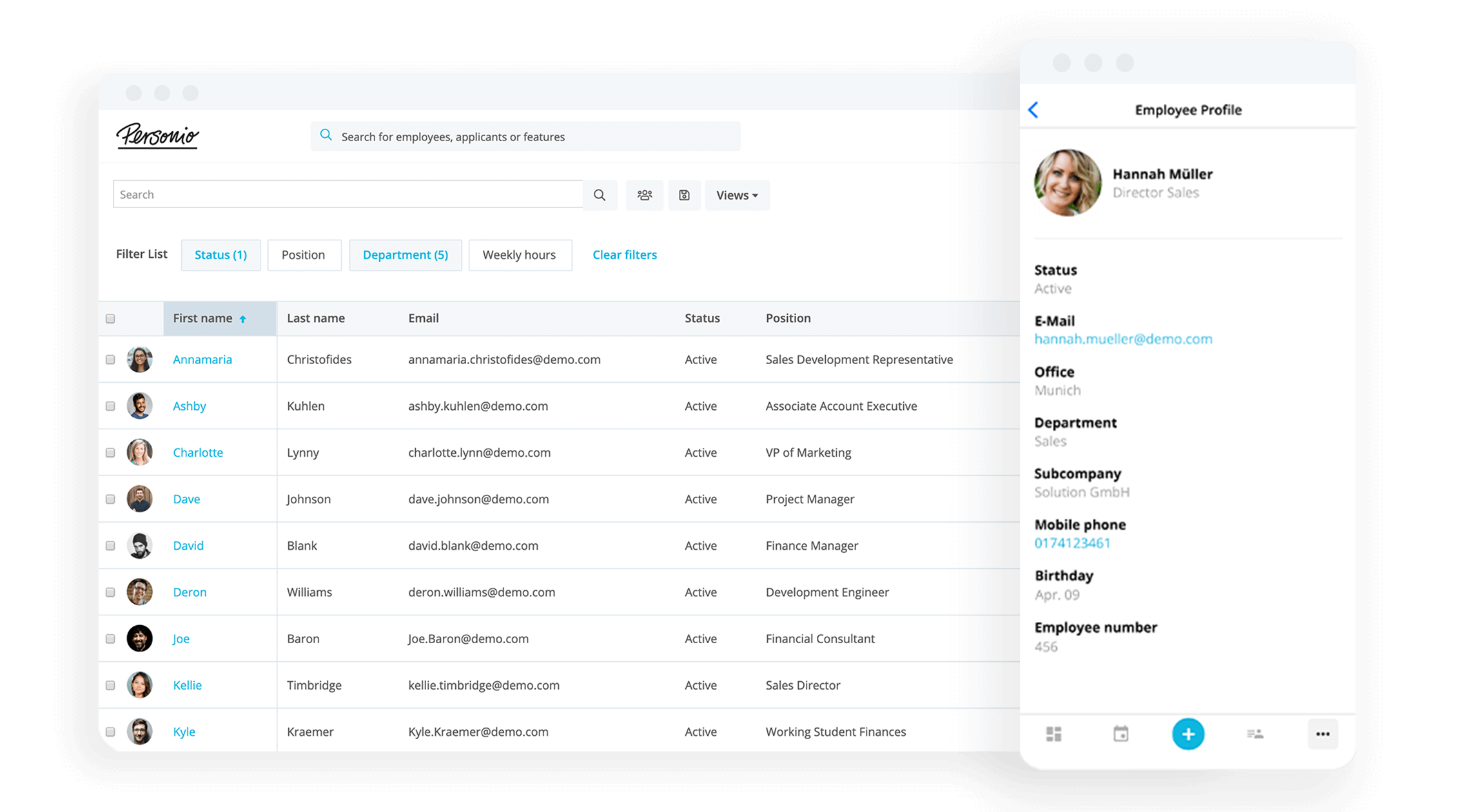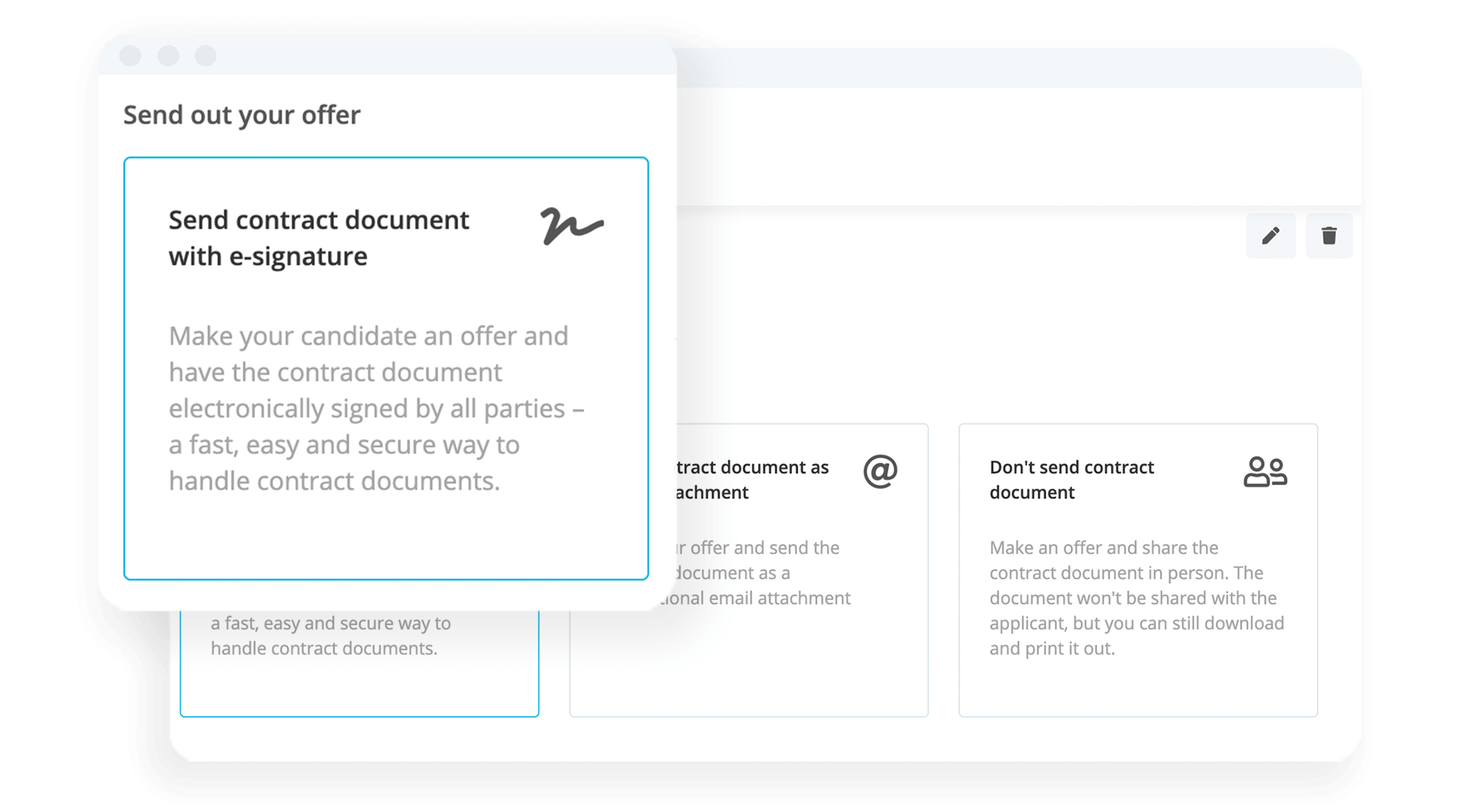An employment contract should form the foundation of any relationship between an employer and an employee. But what does an employment contract have to include and what mistakes should you avoid when creating one?
In this article, we cover all of the most important issues, and more, to provide you with the basics that HR leaders need to know about employment contracts in the UK.
Need somewhere to store contracts? Learn about Personio’s digital employee file today.
Contents
What Is An Employment Contract?
Does An Employment Contract Have to be in Writing?
When Does An Employment Contract Begin?
Why Are Employment Contracts Important?
What Are Common Employment Contract Terms?
How Do You Put Together An Employment Contract?
How Do You End An Employment Contract?
What Is An Employment Contract?
An employment contract, also known as an employee contract or a contract of employment, is the agreement between an employer and the employee that covers the rights, responsibilities, duties, and employment conditions when a person is working for you.
Does An Employment Contract Have to be in Writing?
Yes, and no. According to gov.uk an employment contract does not have to be in writing – at least, not when an employment relationship begins. They say that “as soon as someone accepts a job offer they have a contract with their employer. An employment contract does not have to be written down.”
When someone has accepted a job offer verbally, or in writing, the contract might even begin earlier. For example, acas says that a contract may have been said to begin with the job offer was accepted, and was unconditional (or the person ‘met all the conditions’ and the employer told them in a clear and definite way what the terms of the job were).
Legally, though, according to Sections 1 and 2 of the Employment Rights Act 1996, employees have the right to a “written statement of particulars” of their employment.
It might seem contradictory, but gov.uk says that “The employer must provide the principal statement on the first day of employment and the wider written statement within two months of the start of employment.”
How does this make sense? Think of it this way – a contract can be in writing or verbal at first, but it must be followed up with something in writing.
What does this ambiguity mean for employers? In essence, to be clear, legally sound, and ethical: If you are employing someone to do work for you, it’s better to have the details in writing.
When Does An Employment Contract Begin?
It should be easy to know when an employment contract begins – after all, it’s when someone starts work, isn’t it?
Unfortunately, this isn’t necessarily the case. The official authority on employment in the UK, gov.uk says that, “As soon as someone accepts a job offer they have a contract with their employer. An employment contract does not have to be written down.”
If in doubt, put the dates of the start of the contract and the start of employment (these may not necessarily be the same) in the contract.
Discover Personio: Contract Templates & More
Personio offers a secure library to house all of your HR documents, from employment contracts to policies and more. Click the button below to see how it works.
Why Are Employment Contracts Important?
Contracts remove ambiguity. NI Direct, which has employees’ interests at heart, says that “having a written contract could cut out disputes with your employer at a later date” – but it goes both ways. Contracts protect both employers and employees.
It is an employees’ responsibility to ask about elements of a contract which they don’t understand, and it is your HR team’s responsibility to be able to explain these terms.
Contracts help reduce risk, they set standards, and they help your company protect your sensitive information. They also provide reassurance about what is expected of an employee, and what the employer will provide them in exchange for their work.
What Does An Employment Contract Have To Provide?
The legal parts of a contract are called ‘terms’. According to acas, an employment contract must summarise the main terms of employment such as the pay and working hours (see the list of ‘specific terms’, below). But there are many different parts of a contract, as we explain next.
What Are Common Employment Contract Terms?
The ‘terms’ of a contract are the legal parts.
Not all terms have to appear in the contract, though. According to gov.uk terms could be (and should be) in a written contract – but they can also be verbally agreed, those required by law (see ‘statutory terms’), implied terms, and even terms included in an employee handbook, on a company notice board, or in an offer letter (incorporated terms).
Let’s break down these four elements:
1. Specific terms
To meet the terms of Section 1 of the Employment Rights Act the ‘statement of initial employment particulars’ must include – the names of the employer and employee, start date, remuneration (and how often it’s paid), terms and conditions relating to hours of work, information about holidays, sick leave, other leave and pensions, other benefits, notice periods, job title and description, probationary periods (if any), the place of work, training entitlement (if applicable), and a few other pieces of info.
2. Statutory terms
Statutory terms are the worker or employee’s (these are legally different terms) rights, given to them by the government or other courts of law. You don’t have to put these in the contract, explicitly, but they will apply, regardless of whether the business owner thinks they are relevant or not. You might find it helpful to read this HR Lexicon article Employment Law in the UK: An Overview for HR Leaders to find out more.
3. Implied terms
When it seems pretty obvious that employees should behave in a certain way (for example, they shouldn’t lie, cheat, or steal) then most people don’t think it’s necessary to put this into a contract. Implied terms are terms that are, quite frankly, too obvious to need to be written.
There are other implied terms that ‘might also be implied through custom and practice’. When this occurs, moneyadviceservice.org.uk they can also be considered to be implied terms. For example, if employees have been given an annual bonus every December for the last 10 years, this would be an implied term. It becomes ‘implied’ if this behavior is uninterrupted, long-standing, automatically received, expected and well-known.
(If you want to change an implied term then it might be wise, or even necessary, to change your employment contracts. This article by the National Federation of Self-Employed and Small Businesses Ltd (FSB) advises on how to change employment contracts.)
4. Incorporated terms
These are terms that might appear somewhere other than the contract itself. As XpertHR says, “if one document is referred to in another it is incorporated”. For example, the terms might appear on a staff noticeboard, in the employee handbook or in an agreement affecting many employees.
It’s very important to make sure that the contract states that these other sources are relevant to the contract. This can also include collective agreements – which are terms and conditions like pay or working hours that have been negotiated with a body like a trade union or staff association. XpertHR also reminds us that, “it is important to make sure that the wording of an incorporated document does not conflict with the contract, as this could lead to a dispute.”
Discover Personio: All Your Employee Data In One Place
Digital employee files with Personio help house all of your important employee data. GDPR-compliant and completely secure, it is the ideal place to keep track of your employees and their critical information. Click the button below for a quick look at how it works.
How Do You Put Together An Employment Contract?
You can write an employment contract yourself from scratch, ask a lawyer to draw one up, start with a template that you’ve found online or one that is built into another system or even tailor an existing document that you’ve acquired.
But, be warned: an employment contract must be relevant to you, your employees, and your business!
If in doubt, get an expert to help you create an employment contract the first few times you use it. Then, as you gain confidence or experience over time it will be easier to make sure you’ve dotted all the i’s and crossed all the t’s so your employment contract starts out water-tight and remains so.
Mistakes To Avoid When Creating An Employment Contract
When you are drawing up an employment contract, here are some of the common mistakes that you should be sure to avoid (however you go about putting one together)…
Not having a contract
Firstly, a lot of employers don’t have contracts at all! That’s bad. If you’re in this situation, fix it as quickly as possible. It might be awkward to ask employees to sign a contract if you’ve never asked them to sign one before but, as with all good HR conversations, if you can explain why you’re doing it and how it will help them, it’s much easier to do the right thing for all concerned.
Not keeping contracts up to date
Secondly, employers don’t always keep contracts up to date. When working conditions, salaries, and other information changes (even an employees’ address – if this is stated in the contract), the contract should technically be updated.
Not having contracts for all staff and workers
Thirdly, make sure to have employment contracts for all staff – not just full-time staff. Even temporary staff, part-time workers and fixed-term employees must have contracts.
Not having an employee handbook
Fourthly, don’t forget to include information that might change over time in your employee handbook. (You might also find this Personio HR Lexicon article about Why Employee Handbooks are Essential For Your Organization helpful). As long as you tell your employees every time something changes in this document you can update this supplementary document as an addendum to the contract without having to make employees sign the contract again. Which brings us to the last point…
Not having signed copies stored safely
Lastly, employee contracts must be signed and dated by both parties! And they must be stored, safely, so they can be accessed as and when required. That’s why having an HR information system like Personio can be really helpful.
At the beginning of a relationship, having an HRIS in place can help you get your employees started more quickly because all the documentation is automated (not written on paper forms in mysterious drawers somewhere…) and the processes are easy to follow. It also helps everyone involved in hiring employees (or later, firing them, if sadly necessary) know that the documentation is signed, safe and complete.
What Legal Considerations Should Employers Keep In Mind?
As described above, it’s important to remember that an employment contract forms the basis of your relationship with your employer.
If your contract meets the requirements of the Employment Rights Act 1996, and doesn’t conflict with the UK’s statutory rights (including, but not limited to statutory sick pay, redundancy pay, parental leave and holiday) then you should be good.
Looking to include a gardening leave clause in an employment contract? Here’s our guide to help.
Digitally Sign Employment Contracts From Personio
When it comes to contracts, it all comes down to signing on the dotted line. Using Personio, you can offer digital e-signature functionality to help sign contracts, policies, and more. Click the button below to see it in action today.
How Do You End An Employment Contract?
An employment contract can be terminated by either the employer or the employee. There is legislation in the UK about handing in one’s notice (statutory notice) but whether they have to give written or verbal notice depends on what’s written in their contract.
If in doubt, refer to the contract first when ending an employment contract (this goes for both employers and employees) or consult an employment solicitor.
Disclaimer
We would like to inform you that the contents of our website (including any legal contributions) are for non-binding informational purposes only and does not in any way constitute legal advice. The content of this information cannot and is not intended to replace individual and binding legal advice from e.g. a lawyer that addresses your specific situation. In this respect, all information provided is without guarantee of correctness, completeness and up-to-dateness.
HR Templates
Using Personio







